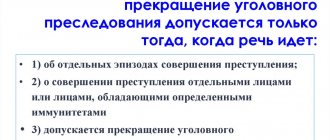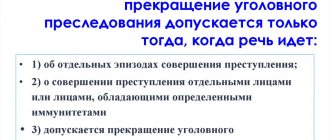New edition of Art. 28 Code of Criminal Procedure of the Russian Federation
1. The court, as well as an investigator with the consent of the head of the investigative body or an inquiry officer with the consent of the prosecutor, have the right to terminate criminal prosecution against a person suspected or accused of committing a crime of minor or medium gravity, in cases provided for in part one of Article 75 of the Criminal Code of the Russian Federation.
2. Termination of criminal prosecution of a person in a criminal case for a crime of a different category when the person actively repents of the crime committed is carried out by the court, as well as by the investigator with the consent of the head of the investigative body or by the investigator with the consent of the prosecutor only in cases specifically provided for by the relevant articles of the Special Part of the Criminal Code of the Russian Federation .
3. Before the termination of criminal prosecution, the person must be explained the grounds for its termination in accordance with parts one and two of this article and the right to object to the termination of criminal prosecution.
4. Termination of criminal prosecution on the grounds specified in part one of this article is not allowed if the person against whom the criminal prosecution is terminated objects to this. In this case, criminal proceedings continue as usual.
Another comment on Art. 28 Criminal Procedure Code of the Russian Federation
1. According to Part 1 of Art. 75 of the Criminal Code, to which Part 1 of the commented article refers, the meaning of active repentance is that a person who has committed a crime of minor gravity for the first time, after committing the crime, voluntarily confessed, contributed to the detection of the crime, compensated for the damage caused or otherwise made amends for the damage caused as a result of a crime.
2. According to part 2 of the commented article (in the Criminal Code of the Russian Federation it corresponds to part 2 of article 75), criminal prosecution can be terminated, and the perpetrator of kidnapping can be released from criminal liability if he voluntarily released the abducted person (note to article 126 of the Criminal Code ); in the purchase and sale of a person who voluntarily released the victim, under the conditions specified in the note to Art. 127.1 CC; and in a whole range of grave and especially grave crimes under the conditions specified in the notes to Art. Art. 204, 205, 205.1, 208, 210, 222, 223, 275, 282.1, 307, 337 CC.
3. Part 1 of the commented article states that the court, as well as the investigator or inquiry officer, has the right, but not the obligation, in all cases without exception to terminate criminal prosecution on the basis of this article. Taking into account the specific circumstances of the case and the personality characteristics of the accused, the investigator has the right to complete the investigation by drawing up an indictment and if there are all the formal grounds provided for in this article for termination of criminal prosecution.
4. Having identified the grounds for termination of criminal prosecution in connection with active repentance, the court, prosecutor, investigator or investigator in charge of the criminal case must inform the suspect or accused of their intention and explain the essence of the planned procedural decision, as well as the right to object to it . If there is such an objection, the criminal prosecution cannot be terminated; the proceedings must be continued at the will of the suspect or accused in the usual manner until trial, where the defendant receives the most favorable conditions for defense against the charges and rehabilitation.
5. The decision of the investigator to terminate the criminal prosecution on the basis of the commented article acquires legal significance only if there is a mark on this document indicating the consent of the prosecutor signed by him, and a decision of the investigator - only if there is such a mark signed by the head of the investigative body.
Death of a suspect
In accordance with the rules of law, cases are terminated on the basis of the death of the suspect without fail. The exception is when further proceedings are necessary to rehabilitate the deceased. In order to issue a decree to terminate a case due to the death of a suspect, the official must obtain a corresponding certificate from the civil registry office. Of course, the case can also be terminated if death is confirmed by a court decision.
Termination of the case against the deceased is possible only in a situation where this is the only basis for making such a decision. If it is not possible to prove that it was the deceased who committed the crime, then the case is terminated on the basis that gives the right to rehabilitation.
If a criminal act was committed by a group of people, then the criminal prosecution procedure against the deceased should be stopped. However, the matter does not stop.
Arbitrage practice
Examples from judicial practice:
- Citizen E. was accused of causing minor harm to the health of the victim K. In accordance with the charges brought against E., a criminal case was initiated under Art. 115 of the Criminal Code.
From the petition filed by the defense, the court obtained evidence that E.’s actions were due to the need for self-defense. The victim K. was the first to use physical force, as a result of which the accused E. was forced to defend himself.The evidence specified in the petition, which includes the testimony of witnesses, was recognized by the court as a basis for dismissing the case.
- A criminal case was initiated against the accused O. under Art. 213 of the Criminal Code - hooliganism. According to the bodies of inquiry, the accused, who has a weapon at his disposal, committed a gross violation of public order . From the petition filed by the defense, the court received information about the absence of evidence that O. had weapons, and the presence in O.’s actions of signs of a gross violation of public order. Based on received information, the case was closed.
Thus, in the absence of signs of illegal actions in the actions of a citizen, it is permissible to file a petition to terminate the criminal case.
The document is drawn up and submitted to the authorized bodies in accordance with existing rules established by law.
Consequences of termination of the case
The issuance of a ruling affects all aspects of the process. This is most important for the life of the former suspect. This person receives the right to rehabilitation (if there are grounds). This consists of paying material compensation and organizing information support. The state is paying for the mistakes of investigators.
That is, a wrongfully accused person files a claim against the Ministry of Finance of the Russian Federation.
The list of rights of an innocent victim is given in Part 1 of Article 133 of the Code of Criminal Procedure. The former defendant may demand:
- Compensation for material damage resulting from loss of income (during arrest).
- Restoration of the right to reside in previously occupied premises if evicted due to criminal prosecution.
- Compensation for moral damage.
- Reinstatement to the previous place of duty.
- Resumption of pension accruals, if they were suspended.
Payments are made based on the relevant court decision. That is, a person who has suffered from arbitrariness/error of the investigation is obliged to file a claim with this authority. It is allowed to include the following proven material losses:
- Costs for the services of lawyers and other specialists.
- Unpaid benefits from the state due to criminal prosecution.
- Fines contributed to the budget in order to implement a canceled court decision.
- The value of the confiscated property.
- Expenses for restoring health, completing a rehabilitation course.
Each position of the claim must be supported by documents. The judge carefully examines the evidence. The decision is made in a balanced, fair and justified manner. In the absence of exonerating circumstances, the former suspect simply avoids responsibility. But the law gives a person the right to refuse to close a case. He is not required to state reasons. In such a situation, the investigation proceeds as usual.
Lack of a statement from the victim and reconciliation of the parties
According to the fifth paragraph of the first part of Article 24 of the Code of Criminal Procedure, a private or private-public prosecution case must be terminated if it was initiated without a statement from the injured party. The exception is cases in which the right to initiate proceedings is granted to officials.
Article 25 of the Code of Criminal Procedure of the Russian Federation states that it is possible to terminate the case if the parties have reached reconciliation. This is possible due to a combination of the following factors:
- there was a crime of minor or moderate gravity;
- the person committed a criminal act for the first time;
- the existence of a fact of reconciliation and a corresponding statement from the victim;
- making amends for the harm caused, expressed in any form;
- the presence of consent from the investigative or inquiry authorities, in particular the official in charge of the case;
- absence of objections on the part of the accused.
At the same time, according to the second part of Article 20 of the Code of Criminal Procedure of the Russian Federation, no additional conditions are required to terminate the case for reconciliation of the parties. Of course, we are talking about private prosecution cases.
Separately, it is necessary to mention such a basis for termination of the case as active repentance. This possibility is regulated by Article 28 of the Code of Criminal Procedure. Termination of the case is possible if the crime was committed for the first time and is of minor or moderate severity. It should be noted that the practice of terminating criminal cases for all of the above reasons is quite extensive. Human rights activists believe that from the point of view of their activities, this is a good sign.
What to pay attention to
When drawing up a petition to terminate a criminal case, it is necessary to first determine what reasons the court may recognize as valid for granting the petition.
It is imperative to indicate in the final part that you are familiar with the consequences of termination of the case, and, moreover, to motivate your petition. After all, without the proper motivational part, such a request simply will not be approved.
At any stage of the trial, but before sentencing, a motion to dismiss the criminal case may be filed. To compile it, it is necessary to follow the structure and understand the Code of Criminal Procedure and the Criminal Code of the Russian Federation.
But if there really are grounds and the court does not see any pitfalls or dangers, then the petition will definitely be granted and the appropriate resolution will be issued.
How to terminate an ongoing criminal case
Production is always subject to a certain algorithm. The investigator and the prosecutor have no opportunity for creativity. The procedural procedure for the practical termination of a criminal case and criminal prosecution is reduced to the following stages:
- Identification during the investigation of the basis for such a decision. It is necessary to take into account that procedural persons are obliged to strictly implement the current legislation and take into account all the provisions of the codes. They must see for themselves the reason why the investigation can be completed before or during the trial.
- Confirmation of the identified basis with evidence. Here the work of the investigation is supported by the defense, which provides relevant materials.
- Decision-making. If necessary, a judge is involved in the process. The prosecutor always participates in resolving the issue, performing a supervisory function.
In fact, the conditions for terminating the criminal case under investigation are listed in the paragraphs of the Code of Criminal Procedure. The parties to the process try to bring the case to one of the outcomes. The investigation is to prove guilt, the defense is the basis for closing the case. The justice system is built with the goal of achieving justice. The method allows the suspect to avoid:
- unjustified persecution;
- penalties if appropriate conditions are met.
The main responsibility in this process undoubtedly lies with the bodies of inquiry and investigation.
It is law enforcement officers who work closely with the evidence base. They know the classification of grounds for termination of a criminal case. Law enforcement officers must strictly follow the law, which means taking into account all the circumstances of the crime, including those giving the right to close the case.
In addition, in order to prevent abuses in the field of disclosing criminal acts, there is an institution of supervision. Any decision of the investigator is sent to the prosecutor’s office within 24 hours. A government agency employee is obliged to check the document’s compliance with the norms of current legislation. Among other things, he identifies the grounds for ending the prosecution.
The order is observed in relation to individual episodes of misconduct. Often the criminal is accused of several articles or episodes. If an appropriate basis is identified, the procedural person issues a decision on partial termination of the suspected criminal prosecution. This act allows you not to be held liable for a particular article or episode.
For understanding, let's look at an example. A. was accused of selling drugs on an especially large scale. During the investigation, it turned out that A. invited R. to his home and offered the latter a cigarette with hashish. Subsequently, he persuaded R. to go to a drug dealer to purchase a shipment weighing 200 g. He promised to share the goods.
R.'s testimony was not confirmed. A. claimed that he purchased the lot for personal use and did not intend to share it with a friend. The court decided to partially terminate the prosecution of A. under paragraph 2 of Article 228.1 of the Criminal Code (sale of drugs on an especially large scale). Reason: lack of corpus delicti.
Why you need to contact a lawyer
By law, the investigator must investigate the case impartially, objectively and professionally. But in practice everything is completely different.
The investigator needs to submit the criminal case to the court. And what “quality” it will be is the tenth question, because without a lawyer the court will side with the investigator.
Also read: Which article regulates the type of crime - theft
The courts believe the testimony of the police officers themselves unconditionally. The testimony of these employees is called “operational information”, this is the disguise. It is assumed that “operational information” is objective, and a conviction can be based on it.
The court does not want to believe the testimony of defense witnesses. The court believes that they are biased, they are at one with the defendant, etc.
Witnesses? Investigators have “regular” witnesses at the ready who will sign and confirm anything in court. These may be cadets from departmental universities. Of course, they are on the side of the investigator, because they themselves are future investigators.
In cases, for example, about drugs, drug addicts themselves can be witnesses, who thus ensure that the investigator does not touch them for the time being. What kind of termination of a criminal case is there? This is “-1 case” in statistics for the investigator.
Without the help of a lawyer, the investigator will drag the case to trial, even if it becomes obvious that the suspect is innocent. But in court, maybe the case will somehow slip through... Could the judge be indignant and send the case for further investigation? Maybe, of course. If a judge is a conscientious and competent person, such people will meet. But it's better to be safe.
It is important to know: the investigator needs good statistics, so criminal cases are carried out even if they should be terminated. It reaches the point of absurdity. The court believes the investigator more and more willingly than the defendant: one government agency treats another government agency with understanding. And the investigator has more experience in legal matters than the one who got into trouble. What can you do without a professional lawyer whose services you can get? Just go to jail.
Important to know: remember that a lawyer is the only person involved in the case who wants to protect you and knows how to do it. A lawyer knows how to achieve a truly independent examination. How to attract witnesses and force the investigator to take their testimony into account. How to prove your alibi.




